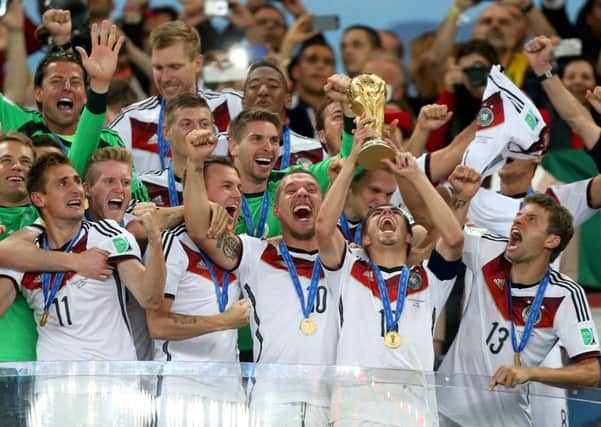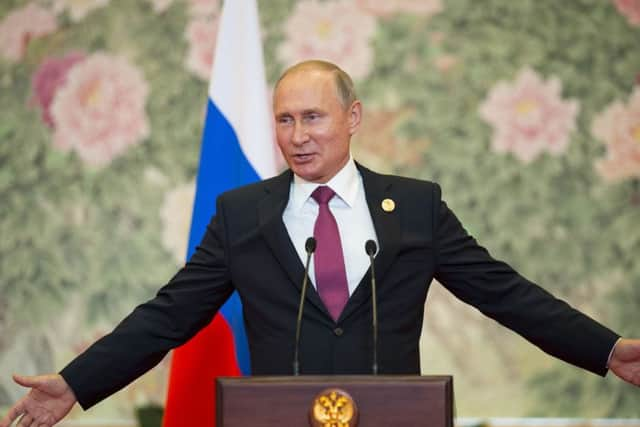Richard Sutcliffe: World Cup offers Russia the chance to rebuild its battered image


Winston Churchill’s famous BBC oration about Russia just a few weeks after the outbreak of the Second World War still resonates today.
This lack of understanding as to just what makes a nation that occupies an eighth of the globe’s land mass tick is why the 2018 finals are shaping up to be a World Cup like few others.
Advertisement
Hide AdAdvertisement
Hide AdCertainly, not since 1978 and a junta-led Argentina played host has a tournament kicked off under quite as big a cloud as this one will come Thursday afternoon.


Relations between Russia and the rest of the world, already frosty following the annexing of Crimea in 2014 and the shooting down of a Malaysia Airlines passenger plane later that same year, have deteriorated markedly since March’s poisoning of former spy Sergei Skripal and daughter Yulia on British soil.
The Kremlin continues to refute the British Government’s claims it was “highly likely” that they were behind the attack in Salisbury but 30 countries, many competing at this World Cup, have expelled around 150 Russian diplomats amid the on-going fallout.
Concerns over hooliganism and racism, both prevalent in Russian football for many years, plus the suspicions surrounding the bidding process also help make this the World Cup with the biggest potential to leave a nasty taste in the mouth since the 1978 tournament in which Argentina’s military dictatorship is alleged to have aided the host’s subsequent triumph.
Advertisement
Hide AdAdvertisement
Hide AdWhich is a shame, as those supporters heading east over the next five weeks are about to experience a country that can seem bewildering at first but actually offers a culture like few others on the planet.
For a start, every host city is different. Most also have the capability to leave visitors open-mouthed in awe, as happened on my first visit to Moscow in the late Nineties when one particularly long night out ended with a 5am walk across an otherwise deserted Red Square.
Recalling those few minutes spent alone taking in St Basil’s Cathedral, plus the GUM department store that stares across at the Kremlin and Lenin’s Tomb is still enough to make the hairs stand to attention on the back of the neck.
Football, of course, has a similar capacity and this is never more so than at a World Cup. Regardless of colour or creed, certain moments remain embedded in the mind. Be it Maradona’s slalom through the England defence in 1986 or Marco Tardelli’s goal celebration in the final four years earlier.
Advertisement
Hide AdAdvertisement
Hide AdThe challenge for Russia 2018 is to throw up similar iconic moments for the watching world in a host of venues that have come a long way since that first visit behind the old Iron Curtain by yours truly.
Back then, dilapidated concrete bowls abounded. Little had changed since these venues, complete with floodlights that towered over the entire local area, had been built as a testament to the power of the old Soviet Union decades earlier.
Compared to the arenas back home that had been rebuilt in the wake of the Taylor Report into the Hillsborough disaster, Russia’s crumbling terraces with little or no cover for supporters felt like exactly what they were – a throwback to a different age.
Today, all 64 World Cup matches will be played in stadia light years away from those monoliths of the past.
Advertisement
Hide AdAdvertisement
Hide AdThere will also be the intriguing new twist of video replays being used for the first time.
No longer will we see a repeat of controversies such as Maradona’s ‘Hand of God’ or the ‘goal’ that Frank Lampard was denied in 2010 despite the ball being a good foot over the line. Or so the advocates of VAR claim.
As anyone who has watched the FA Cup this season knows, this new innovation, which at the World Cup will feature 33 broadcast cameras, has the potential to confuse as much as clarify when the big calls are being made.
Much of the problem last season centred on supporters in the stadium being left totally in the dark by the absence of even one replay when those watching at home were treated to several. Only the delay, together with the referee briefly raising a hand to his ear, informed those who had paid hard earned cash to be there that VAR was being used.
Advertisement
Hide AdAdvertisement
Hide AdA step forward from the system used in England during 2017-18 means that information will be relayed, via the giant screen, to supporters inside the stadium in graphic form. Nevertheless, VAR has the potential to be the abiding memory of the 2018 World Cup rather than any great deeds on the field.
Let’s hope not, as there has been enough negative publicity surrounding the decision to take the tournament to a country that, in terms of footballing pedigree and representing uncharted territory when it comes to staging a World Cup, deserved the nod ahead of joint bids from Spain/Portugal and Holland/Belgium, plus a flawed attempt by England to once again bring football home.
For now, suspicion abounds with journalists heading to Russia from the UK for the World Cup having been told not to log on to the local wi-fi, even though their newspapers have ensured all laptops are wiped clean before travel. Use of mobile ’phones will also be restricted to new android handsets provided specifically for the tournament.
Such thinking may have its roots in Churchill’s famous 1939 description of Russia still being deemed to be relevant almost eight decades on.
Advertisement
Hide AdAdvertisement
Hide AdWhat many don’t realise, however, when quoting this sentence is that Churchill’s words did not end there.
Instead, while outlining what he believed to be Russia’s war-time intentions, the future Prime Minister added: “But perhaps there is a key. The key is Russian national interest.”
National interest, this correspondent fervently believes, will ensure the 21st instalment of the World Cup is a tremendous success.
This is Russia’s chance to refashion its image on the global stage. Or at least to challenge what the Kremlin considers to be big misconceptions.
A successful World Cup is not just needed but demanded, Vladimir Putin knowing full well that the eyes of the world will be on Mother Russia over the next five weeks.